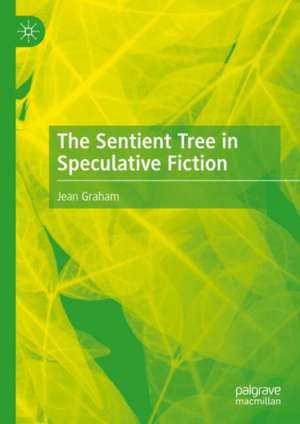The Sentient Tree in Speculative Fiction
Autor Jean Grahamen Limba Engleză Hardback – 12 ian 2025
Preț: 693.00 lei
Preț vechi: 815.29 lei
-15% Nou
Puncte Express: 1040
Preț estimativ în valută:
132.62€ • 144.01$ • 111.40£
132.62€ • 144.01$ • 111.40£
Carte disponibilă
Livrare economică 02-16 aprilie
Preluare comenzi: 021 569.72.76
Specificații
ISBN-13: 9783031605406
ISBN-10: 3031605403
Pagini: 160
Ilustrații: Approx. 160 p.
Dimensiuni: 148 x 210 mm
Ediția:2025
Editura: Springer Nature Switzerland
Colecția Palgrave Macmillan
Locul publicării:Cham, Switzerland
ISBN-10: 3031605403
Pagini: 160
Ilustrații: Approx. 160 p.
Dimensiuni: 148 x 210 mm
Ediția:2025
Editura: Springer Nature Switzerland
Colecția Palgrave Macmillan
Locul publicării:Cham, Switzerland
Cuprins
Chapter One: Introduction. Into the Woods: Metaphor, Mythology, Science.- Chapter Two: Metaphor, Monster, and/or Tree?.- Chapter Three: Mythology and Desire.- Chapter Four: Trans-Corporeality, Pain, and Movement.- Chapter Five: Communication and Community.- Chapter Six: Cooperation and Agency.- Chapter Seven: Competition and Revenge.- Conclusion: Intelligent Trees and Alien Trees.
Notă biografică
Jean Graham is Professor of English at The College of New Jersey, USA, where she teaches teaching early modern British literature, dystopian literature, and speculative fiction. In addition to scholarly work on early modern literature, she has published about Star Trek: Next Generation in Journal of Popular Culture. She has also published on C. S. Lewis in Children’s Literature Association Quarterly, Mythlore, and Children’s Literature.
Textul de pe ultima copertă
"A wonderful, timely, and necessary book that explores the tangled roots of mythology, literature, and culture to illuminate humanity’s complex relationship with the environment. Beautifully written and thoroughly researched."
— Abi Curtis, Professor of Creative Writing, York St John University, UK
This book interrogates the theme of vegetal sentience and consciousness in the form of trees that move purposefully and/or speak, a theme which appears in everything from classical mythology to tTwentieth -century and contemporary literature, which draws on this earlier work. Graham's research includes literary and scientific works on vegetal consciousness and sentience, and applies this ecocritical lens in her analysis of various works of literature, television, and film. This book aims to illustrate how sentient trees in speculative fiction help readers better understand that other beings on Earth and/or the Universe are motivated and able to act on goals and desires, even when those goals may not coincide with those of humans.
Jean Graham is Professor of English at The College of New Jersey, USA, where she teaches teaching early modern British literature, dystopian literature, and speculative fiction. In addition to scholarly work on early modern literature, she has published about Star Trek: Next Generation in Journal of Popular Culture. She has also published on C. S. Lewis in Children’s Literature Association Quarterly, Mythlore, and Children’s Literature.
— Abi Curtis, Professor of Creative Writing, York St John University, UK
This book interrogates the theme of vegetal sentience and consciousness in the form of trees that move purposefully and/or speak, a theme which appears in everything from classical mythology to tTwentieth -century and contemporary literature, which draws on this earlier work. Graham's research includes literary and scientific works on vegetal consciousness and sentience, and applies this ecocritical lens in her analysis of various works of literature, television, and film. This book aims to illustrate how sentient trees in speculative fiction help readers better understand that other beings on Earth and/or the Universe are motivated and able to act on goals and desires, even when those goals may not coincide with those of humans.
Jean Graham is Professor of English at The College of New Jersey, USA, where she teaches teaching early modern British literature, dystopian literature, and speculative fiction. In addition to scholarly work on early modern literature, she has published about Star Trek: Next Generation in Journal of Popular Culture. She has also published on C. S. Lewis in Children’s Literature Association Quarterly, Mythlore, and Children’s Literature.
Caracteristici
Analyses a range of speculative literature and film content to discuss humanity's understanding of the non-human Explores the theme of vegetal sentience and consciousness in the form of trees that move purposefully and/or speak Applies a new, ecocritical lens to a range of works, including that of J.R.R. Tolkien, C.S. Lewis and Ursula Le Guin
